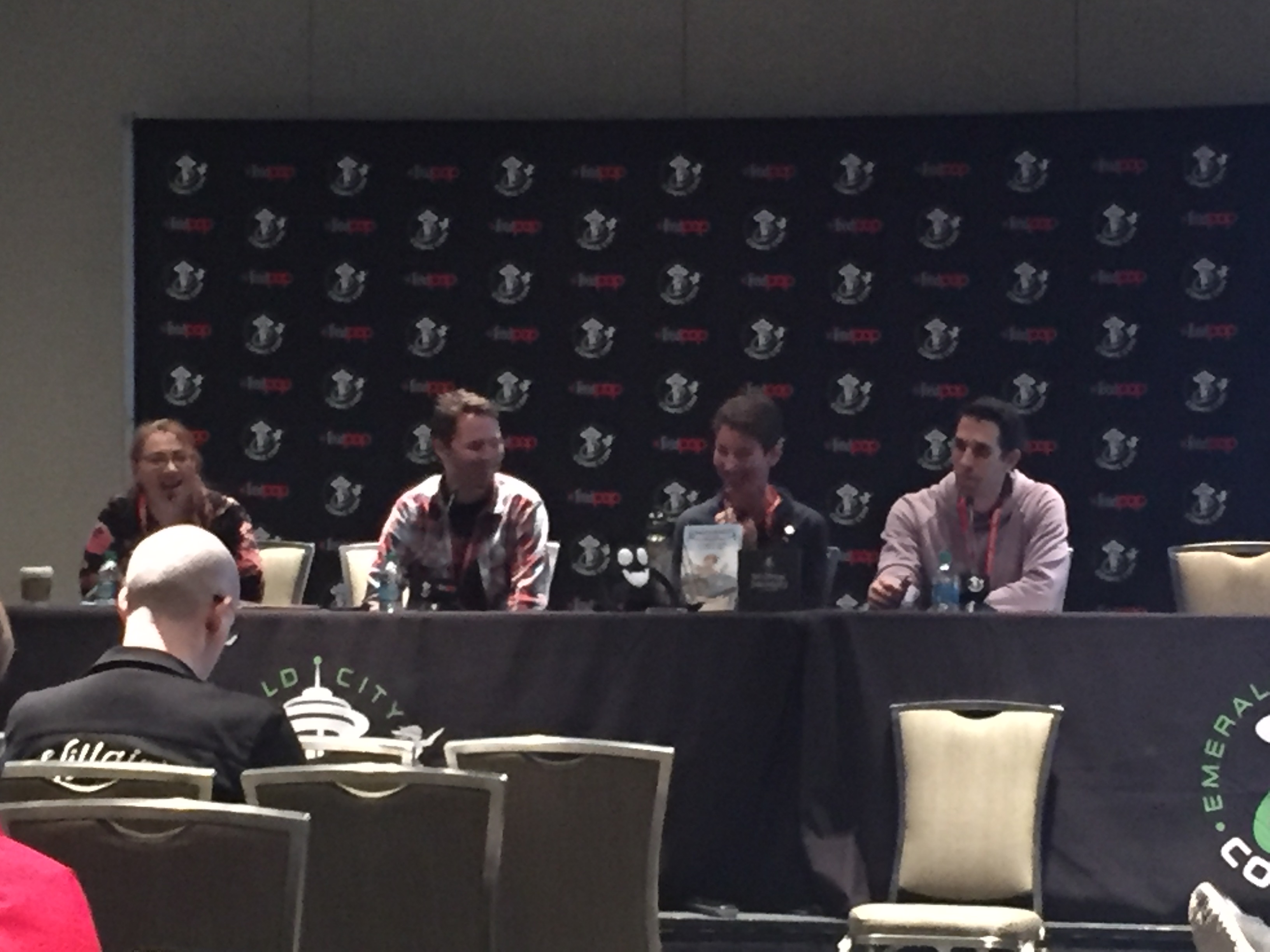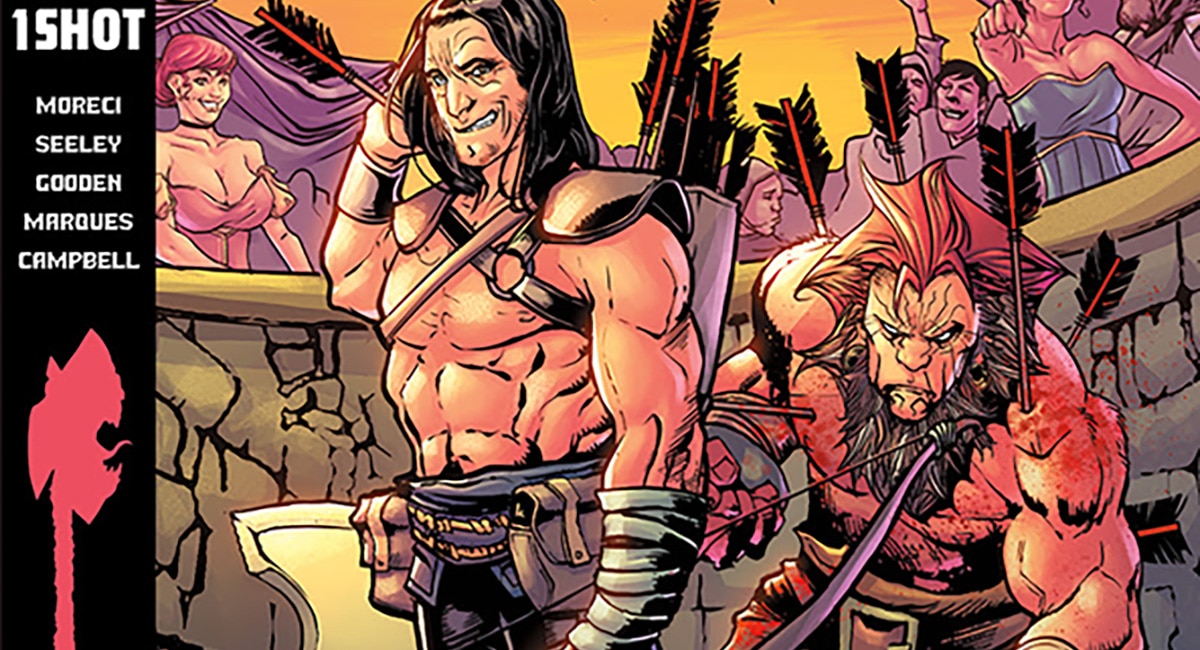
By Joe Grunenwald
There were a handful of panels at this year’s ECCC about the various aspects of creating comics, from how to pitch, to writing and drawing, to editing. One such panel, “Don’t Break In – Independent Careers for Comic Book Creators,” didn’t address any one of those things specifically. Moderated by The Beat’s own Heidi MacDonald and featuring panelists Jake Parker (Skyheart, Inktober), Lucy Bellwood (Baggywrinkles), and Jason Brubaker (reMIND, Sithrah), the panel ended up being a sprawling discussion about how to become a successful independent cartoonist.
After brief introductions for each of the panelists, MacDonald kicked things off by mentioning the many different paths that people take to come to comics. Brubaker previously worked for Dreamworks in animation, while Parker also worked in the animation field. Parker mentioned that he had always wanted to be a cartoonist, and he worked towards that before getting a job in the animation industry when he got married and had kids. He described his work on the Flight anthologies as being done basically out of necessity – he and the other creators couldn’t get published otherwise so they decided to publish themselves. It was noted that other Flight alumni include Raina Telgemeier, Vera Brosgol, and many other successful creators.
Brubaker said he had always wanted to be an artist, but didn’t realize until his mid-thirties that he wanted to tell stories with his art. He became a storyboard artist and worked in animation for seven years, but it never satisfied his artistic urges the way that comics did. He described going to San Diego Comic-Con one year to look for things that inspired him and not finding anything that spoke to him, so he decided to make something himself that he wasn’t seeing elsewhere. Doors began to open up for him in animation as a result, but having not found satisfaction in that field, he started a webcomic instead, at which point things began to grow for him.
Bellwood said that she grew up in a literary and creative environment, but that she didn’t realize you could both write and do art until she saw others doing it on the internet. She mentioned Iron Circus Comics publisher Spike Trotman saying that it takes about 10 years to build a career, which at the time seemed extremely difficult, but that having been creating comics professionally for eight years she can see the logical progression of Trotman’s statement being true. Bellwood mentioned the growth in opportunities for independent graphic novel publishing in recent years, not just in comic-specific publishers having sprung up, but also now that a lot of traditional book publishers have started graphic novel wings.
Parker talked about working on Rocket Raccoon with Skottie Young at Marvel, and how the process felt like working on an independent title. He worked directly and solely with Young, and then Marvel published the book. After Young left, Marvel approached Parker about working on the follow-up series Rocket & Groot, which Parker turned down so he could work on his current independent series. He said he asked himself the question, “Do I want to be known as the Rocket Raccoon guy?” and that answering ‘no thank you’ to that question felt like the right thing to do. It wasn’t until he launched his first Kickstarter that he truly got going, he said, since it committed him to completing the project. He cited Stephen King’s The Dark Tower series as a project that King had wanted to work on but kept putting off until he got hit by a van, at which point he realized that, if he had died, he would never have gotten to write The Dark Tower, so he just did it. Kickstarter was Parker’s van, he said.
Bellwood described her niche as an “adventure cartoonist”, and the difficulty of moving out of that niche with her new book, which she called “a book about feelings”. She mentioned that she saw a lot more widespread relatability in branching outside of a niche that she said was largely about tall ships, and that expanding the types of comics she’s making has increased the ability for readers to be able to see themselves in her work.
In describing how she built her audience, Bellwood spoke about how she has used Kickstarter to publish her books. Her first Kickstarter launched during her senior year of college after, as part of a comics program, she made a 36-page comic about the power of art. The campaign was wildly successful, raising ten times her goal, and her following has been steady ever since. She also mentioned that the tools to create professional-looking products are now more available than they’ve ever been.
The panelists began discussing the rise of Kickstarter and how quickly it has grown in the last six years, and how Kickstarter provides a direct line between creators and customers as a way for customers to see the process and connect with the passion of the creators, which helps build an audience. From there talk turned to maintaining an audience, with Bellwood describing the difficulty of wanting to connect with fans but being unable to do so once her following grew so large. Parker mentioned a strategy of connecting strongly with early followers, who then bring on new followers. Brubaker said that he has a smaller following, primarily through YouTube. They all recommended trying different things and finding what you like and where people can find you, saying that eventually up-and-coming creators can find a way to connect with their fans on the social media platform that they prefer.
Talk then turned to social media in general as being a vital way of connecting with fans. YouTube in particular was mentioned as a way to build relationships with people, since viewers can get comfortable with a creator’s face and their voice. Parker said that he has also started blogging again on his website as a way to connect with people more personally.
The subject of Patreon came up as a way to help pay bills and also to connect with really dedicated fans. Bellwood said that the interaction she has on Patreon is relatively low, but that she knows her supporters there are “the real deal”. She described Patron as being the opposite of Kickstarter, with Patreon supporters not really expecting to receive anything for donating, and Kickstarter supporters always expecting something in return for their support.
Parker asked the other panelists if they think there’s a way to do Patreon without Patreon, becoming truly independent. Bellwood mentioned another platform, Memberful, as an alternative, and Parker talked about using Kickstarter as a way to build an audience and then drive people to his personal shop and sell books outside of the Kickstarter model.
Bellwood talked about dealing with the direct market and learning about how those shops work as another outlet for her books. She specifically noted that selling through a distributor to shops greatly reduces the profit margin, and she stressed the importance of thinking about comics as a business like any other.
Parker talked about starting Inktober in 2009 and how it has helped his career and the careers of other creators who participate in Inktober for the full month. He described creating new content every day as a great way to maintain a following and bring in new followers.
An audience member asked if the panelists had any business or marketing podcast suggestions. Parker said that he listens to “Not Your Average Business Podcast,” which breaks down how different successful people got to be that way. He listens to those stories and figures out how what he hears can be applied to the comics field. He also listens to interview podcasts with specific creators to learn their stories. MacDonald plugged the podcast Graphic Novel TK, which runs on The Beat and just launched recently. She described the podcast as being like a course on how to publish graphic novels. Bellwood seconded listening to podcasts outside of the comics industry. She also talked about going to non-comics festivals like the XOXO Festival and meeting other creative people who were doing what she was doing.
Next, an audience member asked about how changes to existing platforms like Patreon has impacted creators’ businesses. Bellwood talked about changes to the fee structure that were rolled out for Patreon last year and how people responded strongly and negatively to those changes, to the point that Patreon ultimately removed the changes. It reminded her that things like Patreon are companies themselves that can change or be shut down at any time.
In response to an audience question about crowdfunding and potential diminishing returns as you crowdfund more projects, Brubaker talked about his experience with backer numbers dropping off as he does more Kickstarter for the same series. He said this is more or less the expected level of attrition as a series continues. He stressed the importance of making each campaign new and unique so it will attract its own audience, as opposed to trying to do the same thing over and over again.
Continuing with questiosn from the audience, they were asked what tools or programs from other industries could be applied to comics, Bellwood talked about the need for more professional development resources in comics. She also reiterated the benefit of branching out to non-comics conventions like XOXO Festival. Comics Camp in Alaska is another program Bellwood mentioned that focuses on the creation of and the business side of comics.
The question of how much of each panelists’ time is spent on creating vs. on the business aspects of being a creator was raised. Bellwood said that her current ratio of business-to-creating was roughly 80/20, and that she is looking into potentially contracting some of the business parts out so that she can focus on the creative side. Parker said that his time is split evenly between the two, while Brubaker said that he devotes one day a week to finances so that he can work the other days of the week.
With the panel wrapping up, Parker suggested, as a takeaway for aspiring professional comics creators, to just go make things, and to figure everything else out later. With that the panel ended.







Hey I attended this! ECCC18 was my first comic-con not working a table for years and I really enjoyed it, with this panel one of the highlights. A surprise treat was Heidi moderating and having a quick chat with her afterwards after reading The Beat for many years from the UK!
Comments are closed.